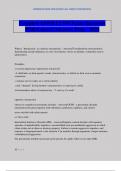©BRIGHSTARS 2024/2025 ALL RIGHTS RESERVED.
Complete ASWB LCSW Exam Questions
With Correct Answers. Prep – 2024
What is "Introjection" as a defense mechanism? - Answer✔Considered the most primitive,
Internalizing outside influences as your own identity. (focus on identity, commonly seen in
adolescents)
Examples:
-in severe depression- hatred turns toward self
-A child takes on their parent's words, characteristics, or beliefs as their own to maintain
connection
-a trauma survivor takes on a victim identity
-a kid "channels" his big brother's characteristics to stand up to a bully
-kid internalizes ideas of someone else - "I cant cry it's weak."
opposite of projection
obsessive-compulsive personality disorder - Answer✔OCPD - a personality disorder
characterized by preoccupation with orderliness, perfection, rigidness, and control
never satisfied with achievements
ex: Steve Jobs
Intermittent Explosive Disorder (IED) - Answer✔Impulse-control disorder with repeated
episodes of unpredictable, impulsive, uncontrollable (not pre-meditated) aggression in which
client strikes out at others or destroys property. Failure to restrain aggressive impulses, and
response is disproportionate to the situation. Can manifest through arguments, temper tantrums,
verbal/physical aggression.
Not persistently irritable mood and can be present for adults. More severe than ODD.
1|Page
, ©BRIGHSTARS 2024/2025 ALL RIGHTS RESERVED.
Dx if at least 6+ yrs old, and "explosion" occurs 2 or more times a week for at least 3 months
(OR child has had 3 incidents of impulsive/uncontrollable physical injury/property destruction in
the last year)
Conduct Disorder (CD) - Answer✔a pattern of repetitive behavior in which the rights of others
or social norms are violated. Bullying, intimidating, truancy, lack of remorse or empathy,
premeditated harmful behaviors, theft, aggression toward people or animals, destruction of
property, theft, serious transgression of rules
Occuring within a 1-year period (with at least one symptom present for 6 months straight), and
onset before age 13.
Leads to antisocial personality disorder after 18.
Disruptive Mood Dysregulation Disorder (DMDD) - Answer✔a depressive disorder in children
characterized by persistent irritability and frequent episodes of out-of-control behavior. Involves
severe, recurrent temper outbursts with a persistent/chornic irritable and angry mood between
outbursts on most days.
Lasting at least 1 year with no more than 3 month periods between symptom episodes
On average, outbursts occur 3+ times/wk
Age of onset before 10 yrs
Diagnosed between 6-18 yrs
What does KSA stand for? - Answer✔knowledge, skills, and abilities
What is the order of the Social Work process? (6) - Answer✔1. Engagement
2. Assessment
3. Planning
4. Intervention
5. Evaluation
6. Termination
What factors influence people and their behaviors in a social environment? (5) - Answer✔1.
Individual Characteristics
2. Interpersonal Factors
3. Institutional Factors
4. Community Factors
2|Page
, ©BRIGHSTARS 2024/2025 ALL RIGHTS RESERVED.
5. Public Policy
What are individual characteristics? - Answer✔Knowledge, experiences, attitudes, beliefs, and
personality, unique to each client
What are interpersonal factors? - Answer✔Social support, work relationships, friendships, and
religious community
What are institutional factors? - Answer✔Rules, regulations, and informal structures in the
organizations client is involved with
(smoking, dress expectations, rules around social interactions)
What are community factors? - Answer✔Formal and informal norms and expectations based on
the social environment where a client lives
What are public policies? - Answer✔Mandated regulations and laws, typically by a government
(wearing seat belts, not using drugs, limits on physical aggression, etc)
What are the most common theoretical perspectives that help explain human behavior? (8) -
Answer✔1. Systems Theory
2. Conflict Theory
3. Rational Choice Theory
4. Social Constructionist Theory
5. Psychodynamic Theory
6. Developmental Theory
7. Social Behavioral Theory
8. Humanistic Perspective
Systems Theory - Answer✔Multiple parts in an environment are interrelated where each part
impacts all other parts as well as the system as a whole.
Conflict Theory - Answer✔The idea that conflict between competing interests, resources, and
power is the basic motivating force of social change and society in general
Rational Choice Theory - Answer✔By nature, people are rationale and goal oriented and will try
to maximize rewards and minimize costs. Behavior is explained when viewed through self-
interest.
3|Page
, ©BRIGHSTARS 2024/2025 ALL RIGHTS RESERVED.
Social Constructionist Theory - Answer✔Social reality is created when clients develop a
common understanding of their world through social interaction. They are influenced by social
processes that are grounded in customs, as well as cultural and historical contexts.
(BLM, Nationalists, Native American, etc.)
Psychodynamic Theory - Answer✔Human behavior is motivated by conscious and unconscious
mental activity where experiences, particularly in developmental years, are central. Defense
mechanisms are used to avoid being overwhelmed.
Developmental Theory - Answer✔Human development is a complex interaction of biological,
psychological, and social factors. Development occurs in defined, age-related stages that build
upon one another.
Social Behavioral Theory - Answer✔Human behavior is learned when clients interact with the
environment through association, reinforcement, and imitation. Behavior and can be changed
through techniques such as classical and operant conditioning.
Humanistic Perspective - Answer✔Each client is responsible for their own choices and have the
capacity to change themselves. Human behavior is driven by a desire for growth, meaning, and
competence. Behaving in ways inconsistent to this causes anxiety.
Why does social development matter? - Answer✔Human beings are inherently social.
Developing competencies in this domain enhances a person's mental health, success in work, and
the ability to achieve life tasks.
In order of research development, who were the prominent theorists of developmental research
and their associated research? (5) - Answer✔1. Sigmund Freud (Psychosexual)
2. Erik Erickson (Psychosocial)
3. Jean Piaget (Cognitive)
4. Lawrence Kohlberg (Moral)
5. James Fowler (Spiritual)
Who developed the psychosocial theory of Life Stages? - Answer✔Erick Erickson
How many life stages are there in Erickson's theory? - Answer✔8
What are the 8 psychosocial stages of life and their corresponding ages? - Answer✔1. Infancy:
birth-1 year
2. Early childhood: 1-2 years
3. Preschool: 3-5 years
4|Page




